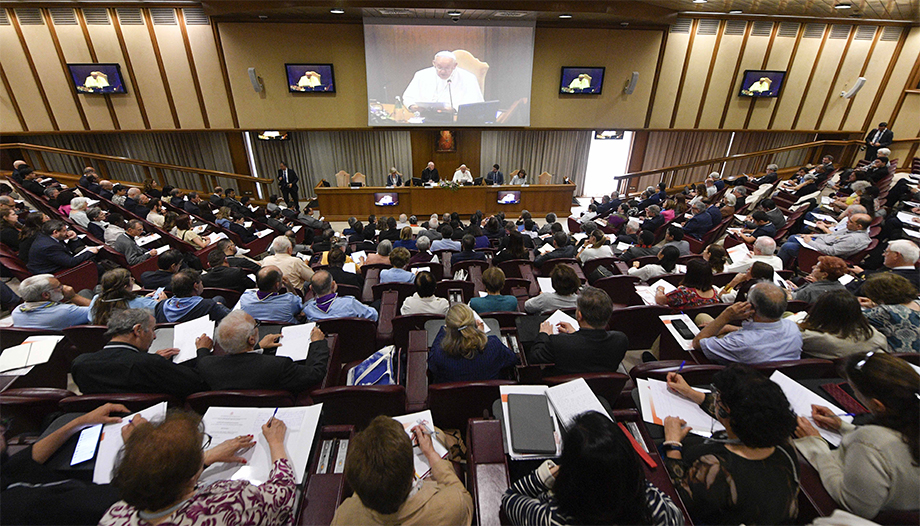Thinking according to God, overcoming all closed-mindedness and cultivating humility. These are the three "synodal virtues" that Pope Francis proposed to the more than 200 representatives of Associations of the Faithful, Ecclesial Movements and new Communities gathered in the New Hall of the Synod for the annual meeting convened by the Dicastery for the Laity, the Family and Life.
The Pontiff also reiterated the importance of spiritual conversion in order to make synodality a shared "ecclesial style". Prohibition, therefore, of attitudes of pride and closed-mindedness that are detrimental to an open and inclusive vision of the Church's mission. It is not by chance that the title of the meeting convened this year by the Dicastery was "The Challenge of Synodality for the Mission". An opportunity to take stock of how this time of consultation, reflection and dialogue is progressing in the dozens of Associations of the Faithful spread throughout the world.
Tuning in to God
Entering into the merits of the Pope's speech, the initial invitation referred to the need to move from a "mere human thought" to a "thought of God", recalling that the protagonist of every evangelizing and synodal journey is the Holy Spirit.
"Let us never take for granted that we are in tune with God," the Holy Father admonished, encouraging us to overcome ecclesial fashions to authentically embrace God's will.
The temptation of the closed circle
Secondly, Francis warned against the temptation of the "closed circle", inviting us to open ourselves with great courage to new pastoral modalities, allowing ourselves to be "wounded" by the voice and experience of others, especially those who do not belong to our own enclosure or circle.
In fact, it is necessary to start from the assumption - directly addressing the Movements - that "their own spirituality, they are realities to help walk with the People of God, but they are not privileges".
Humility against divisions
Finally, the third aspect: the need to cultivate humility, defined by the Pope as the "gateway to all the virtues. Only the humble, in fact, value others and make the "we" of the community emerge, avoiding divisions and tensions.
"And if we realize that, in some way, a little pride, or pride, has made a breach in us, then we ask for the grace to be converted back to humility," Francis explained. Only those who are humble are capable of accomplishing "great things in the Church", because "they have a solid foundation, founded on the love of God, which never fails, and for this reason they do not seek other recognitions".
The Gathering
The day had opened with the celebration of Holy Mass in St. Peter's Basilica, presided over by Cardinal Kevin Farrell, Prefect of the Dicastery, who also introduced the meeting immediately after the Audience with the Pope.
Synodality, Farrell said, is not put into practice by inserting the laity in "places of power" or by creating bodies to show that they are "more involved in the decision-making processes. Rather, it is about fostering that communion that should serve "to truly walk together - laity and pastors, charisms and ecclesial institutions - and to find together the path that the Spirit indicates to carry forward, with new impetus, the evangelizing mission of the Church."
This topic was addressed in detail by Rafael Luciani, professor at the Andrés Bello Catholic University of Venezuela, followed by Elisa Lisiero, an official of the Dicastery, who explored the theme of synodality in the experience of the movements.
The 117 associations
There are currently 117 institutions under the direct jurisdiction of the Dicastery for the Laity, Family and Life, divided between international associations of the faithful, private and public, and other entities with juridical personality. The list and contacts are freely available on the Dicastery's website.
The last association in order of time that has received pontifical recognition is the "Association for the Protection of the Environment".Magnificat Community"It has dozens of fraternities in Italy, Romania, Turkey and Argentina, with the Eucharist at the center of the personal and community life of its members and evangelization as its main charism.









